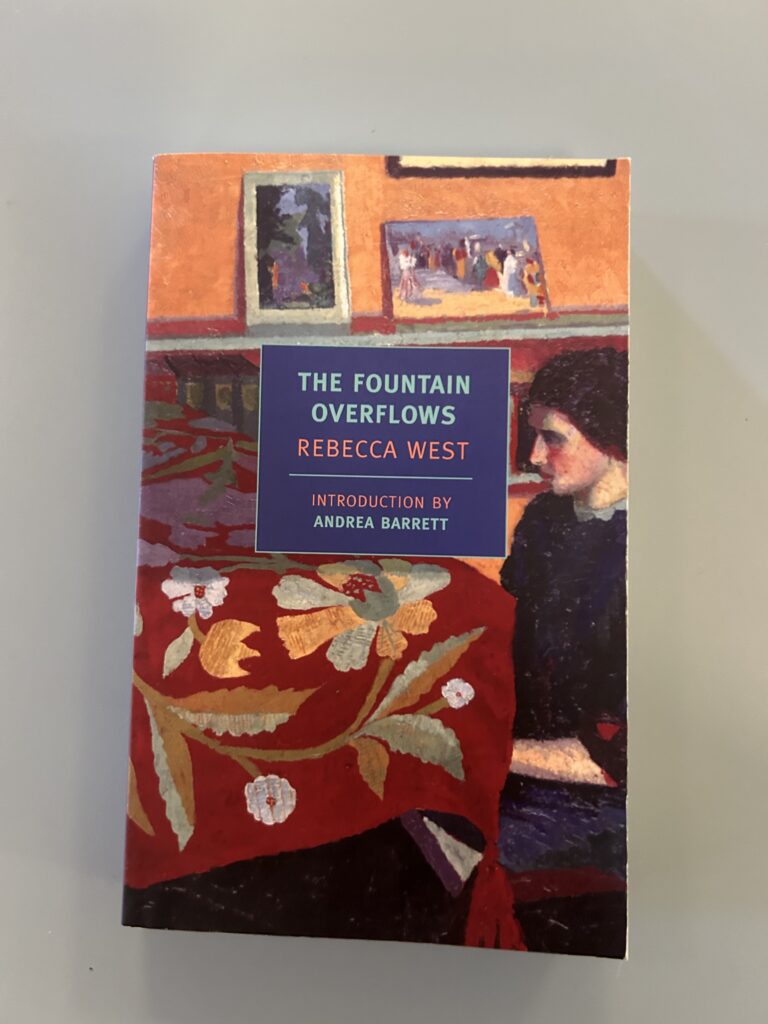Writing about Understanding

Rebecca West’s The Fountain Overflows. Photograph by Sophie Haigney.
The paragraph is perhaps an undercelebrated unit of writing. Sentences get their due, as do individual words, but paragraphs? At the Review, we’ve asked writers to select a favorite paragraph and write a paragraph—or several!—on it. This is our first piece in a periodic series.
“Yes, I think you three have been quite happy. But I doubt if Cordelia has enjoyed a single moment of her childhood. It has all been a torment to her. She is not selfish. It is not what she has lacked that is an agony to her, it is what we all have lacked. She has hated it that all our clothes have been so shabby and that the house is so broken down. She has hated it that I have always been so late in paying Cousin Ralph the rent. She has hated it that we have so few friends. She hates it that your father has gone away, but not as you hate it. She would have preferred a quite ordinary father, so long as he stayed with us. She wishes she could have lived a life like the other girls at school. Your father’s writing, my playing, and whatever goes with those things, and the enjoyment we have had, are no compensation to her for what she has lost. Now, do not dare to despise her for this desire to be commonplace, to be secure, to throw away what we have of distinction. It is not she who is odd in hating poverty and”—she felt for the word—“eccentricity. It is you who are odd in not hating them. Be thankful for this oddity, which has brought you safe through terrible years. But do not think you owe it to any virtue in yourselves. You owe it entirely to your musical gifts. The music I have taught you to play must have made you realize that there is a great deal in life which is not affected by what happens to you. Also the technique has been more help to you than you realize. If you are not soft, it is because the technique you have mastered, such as it is, has hardened you. If God had not made you able to play you would be as helpless as Cordelia, and it is not her fault but God’s that she cannot play, and as God has no faults let us now drop the subject.”
This paragraph appears late in Rebecca West’s The Fountain Overflows, which is likely the novel I’ve reread more often than any other. And this passage is one that I return to all the time, both when life is hard and when life seems lenient enough to grant me a moment of reprieve. At the center of the novel are three sisters: Rose and Mary, twins who are prodigies on the piano, and Cordelia, their unmusical sister who dreams of becoming a world-famous violinist. This paragraph comes after Cordelia’s dream is dashed, and Mamma, their mother, who is a genius on the piano, speaks sternly to Rose and Mary and their brother, Richard Quin, admonishing them.
There are many things I love about the paragraph. As I’m typing it out, I’m surprised how long it is. (In fact, many of West’s best paragraphs are long, sometimes occupying an entire page or two.) Readily, West allows a character to speak without authorial interventions or interruptions from other characters. Were I discussing this in a writing class, comments would be bound to arise that this is not the right way to write dialogue, but who cares about the right way or the wrong way to write dialogue when one can listen to an extraordinary character like Mamma talk, as thrilling as listening to Shakespeare or a master pianist? The best writing—not only long passages of description but dialogues, monologues—always has an element of music and an element of poetry in it. This paragraph has both in abundance.
And what Mamma says—“Be thankful for this oddity, which has brought you safe through terrible years. … The music I have taught you to play must have made you realize that there is a great deal in life which is not affected by what happens to you”—is what I often repeat to myself, sometimes in a variation for my own situation: “Be thankful for your oddity, which has brought you safe through terrible years. … The books you’ve read and the books you’ve written must have made you realize that there is a great deal in life which is not affected by what happens to you.” Some people—perhaps many, one imagines—are ready to disagree with the sentiment, which goes against a kind of Americanness by which much of life (and literature) has to be seen and experienced only through the lens of the self: my angle, my story, my identity. Well, the more reason for me to celebrate a different sentiment along with Mamma.
The last thing I would like to say about this paragraph—and also about this novel—is that many writers can write misunderstanding well, but Rebecca West is supreme at writing about understanding. Mamma, in her usual clear-eyed way, has understood each of her family members, but even more than that, she articulates her understanding in the most precise and eloquent manner, without judgment. If this is not what literature is for, what else then?
Yiyun Li is the author of eleven books of fiction and nonfiction, including the novels The Book of Goose and Where Reasons End. She is the recipient of a MacArthur Fellowship, a Windham-Campbell Prize, a PEN/Jean Stein Book Award, and a PEN/Malamud Award, among other honors. She teaches at Princeton University.
Copyright
© The Paris Review
